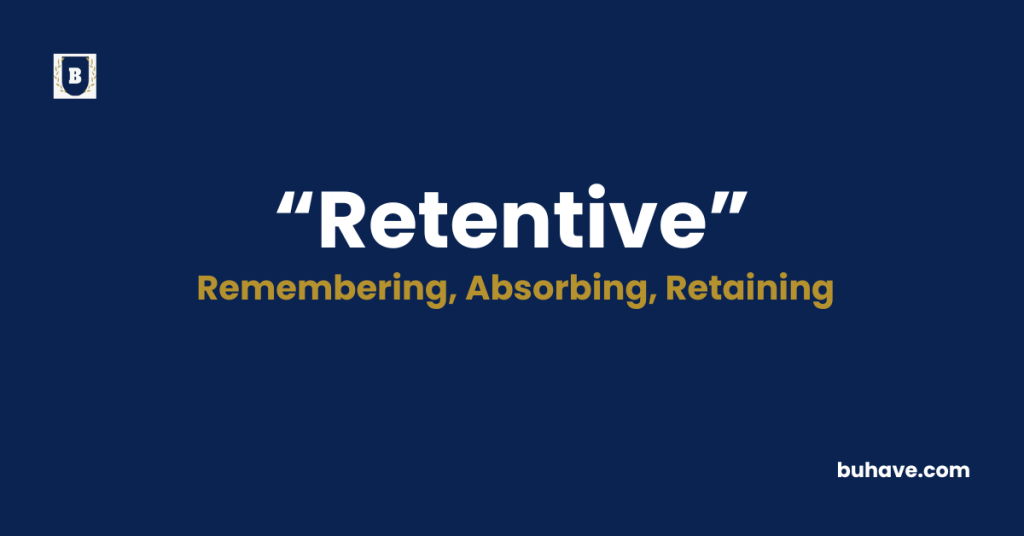The word ‘Retentive’ (Adjective) describes the ability to retain or remember things easily and effectively. In this guide, you’ll learn the full definition, synonyms, antonyms, etymology, and real-life examples of how to use ‘Retentive’ correctly in sentences.
Retentive Explained in Depth
A complete and detailed guide to the word Retentive including meaning, definition, examples, etymology, synonyms, and antonyms.
Meanings of Retentive
Retentive means having the capacity to keep or hold something—especially memory, knowledge, or information. A retentive mind or memory is one that can remember things accurately and for a long time. The word can also describe physical objects or substances that retain moisture, heat, or shape.
For example, someone with a retentive memory can recall facts, figures, or conversations with great detail. In a different context, you might say “clay is water-retentive” because it holds onto moisture well.
Definition:
Retentive refers to the ability to retain, hold, or keep something. It is commonly used to describe someone who has a good memory or an object that has the capacity to hold onto a particular property like moisture, heat, or shape.
When used for people, it often highlights mental strength or cognitive sharpness. When used for things, it reflects physical containment or resistance to loss.
Etymology
- The word “retentive” comes from the Latin word retentivus, meaning “holding fast” or “capable of retaining.”
- This comes from retinere, which means “to hold back” or “to retain.”
- Retinere itself is formed from re- (back) and tenere (to hold).
So, “retentive” literally means “able to hold back or keep something”—whether it’s a memory or a physical property.
Example Sentences:
- She has an incredibly retentive memory and can recite pages of text after reading them once.
- Clay soil is highly retentive of water, making it ideal for certain crops.
- His retentive nature makes him an excellent historian; he rarely forgets a date or event.
Retentive Synonyms:
- Absorptive
- Recollective
- Memorable
- Mindful
- Remembering
- Perceptive
- Attentive
Retentive Antonyms:
- Forgetful
- Oblivious
- Inattentive
- Unmindful
- Unobservant
- Impermeable
- Leaky
FAQs about Retentive
Here are some frequently asked questions (FAQs) about the word “Retentive”
1. What does “retentive” mean in daily life?
It usually refers to someone who remembers things well. For example, a student with a retentive memory can study less but still perform well because they retain knowledge easily.
2. Can “retentive” apply to objects?
Yes, it can describe objects or substances that hold onto certain qualities—like water-retentive soil or heat-retentive metal.
3. Is “retentive” a compliment?
Generally, yes. Saying someone is retentive often highlights their intelligence, strong memory, or sharp thinking.
4. What’s the difference between “retentive” and “receptive”?
- Retentive means you can keep or remember something once you’ve received it.
- Receptive means you’re open or willing to receive new ideas or input—but not necessarily retain them.
5. Can you improve your memory to become more retentive?
Yes, with techniques like repetition, mindfulness, sleep, and memory games, you can train your brain to be more retentive over time.

















